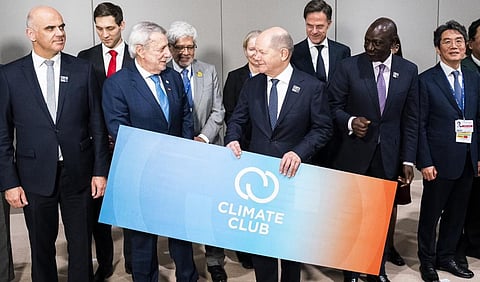

Leaders gathered on the second day of the 28th Conference of Parties (COP28) to the United Nations Framework Convention on Climate Change to formally launch the Climate Club — an initiative aimed at cooperation between countries in decarbonising the industrial sector.
Led by Germany and Chile, the Club has garnered support from 36 member countries including Kenya, the European Union, Switzerland and others. They have each committed to efforts in developing strategies and standards for decarbonisation. The Club is claimed to currently represent 55 per cent of the global economy.
Chairing the event, Germany’s Chancellor Olaf Scholz outlined key priorities for the Club, including the need for groundwork on standardising emission calculations for carbon dioxide (CO2) intensities of certain products, strategic discussions on definitions for net-zero emissions for steel and cement, and the establishment of a platform matching member needs with available financing instruments form public and private sector.
The Climate Club aims to make decarbonisation of industries successful for climate and businesses, through ambitious policies, alignment of methodologies and standards and improving finance and assistance for emerging and developed economies.
The Club’s core idea is based on the fact that the hard-to-abate sectors, including steel, cement, and chemicals, are responsible for about 70 per cent of global CO2 emissions from industry, and developed countries account for a significant share of these emissions.
At the launch of the Club at COP28, the Climate Change Work Programme 2024 was put forward which details programmatic activities of the club. The activities are divided into three key pillars:-
These three pillars are further divided into nine interconnected Modules, setting the pathway for initial work of the club.
Pillars of climate club work programme
Source: Climate club work programme 2024
The governance framework details that two co-chairs will be elected for two-year terms for the Club. Currently, Germany and Chile serve as the co-chairs. A body of members will determine the scope and approve the work programme, budget and amendments.
Furthermore, a steering group will be formed to support the body of members when the Club reaches 40 members. A secretariat will be formed to implement the work program. Currently, OECD and IEA are the joint interim heads of secretariat.
Co-chairing the inaugural event was Alberto van Klaveren, Chile’s Minister of Foreign Affairs, who stressed the urgency of addressing the climate crisis through international collaboration.
Focusing on decarbonising the industrial sector, particularly steel and cement, he acknowledged the unique challenges these sectors pose due to the lack of technological alternatives for achieving zero emissions.
“Climate clubs are a model being explored by countries at a time of increasing polarisation. Western countries are worried by China’s dominance in manufacturing and are looking to form partnerships with others across the Global North and South, to mutually undertake emissons reduction, but eventually trade on favourable terms with “friendly” countries, in this case, members of the Club,” said Avantika Goswami, programme manager, Climate Change at Centre for Science and Environment.
But developing countries must have a voice at the table and an opportunity to lay out their challenges and needs, she added.
The work programme for 2024 will focus on the steel and cement sectors. The launch emphasised the need to speed up the availability of comparable emissions intensity data (module I-1) and its role in overcoming challenges facing the computation of intensity.
The work programme will also concentrate on establishing definitions for green steel and green cement (module II-1). Lastly, setting up a matchmaking platform with a focus on improving industry decarbonisation projects (module III-3).
Speaking at the launch event, the President of the European Commission, Ursula Von der Leyen, touched upon the importance of addressing the issue of access to resources, specifically critical minerals, in the context of developing clean technologies.
The President highlighted the need to diversify and strengthen supply chains with countries that possess critical minerals. Von der Leyen further said that countries may collectively establish a global goal at the summit to triple renewable energy and double energy efficiency by 2030. The leader of Denmark also referenced the targets in her comments.
The members also highlight the risks of carbon leakage and address it through dialogue on risk to mitigation efforts and green growth opportunities in their joint statement.
The representative of the United Kingdom highlighted three key areas of focus within the Climate Club. First, the importance of creating baselines for sustainable standards in industrial products. Second, understanding and addressing the carbon leakage risk. And third, support for workers and industries.
The UK pledged support through financial assistance, contributions to the Green Climate Fund and collaboration with the Breakthrough Agenda to make clean technologies more affordable.
A policy brief on the Climate Club by Germany-based think tank EPICO KlimaInnovation recommends that the club should pilot with the steel sector and focus on quick wins which are basically outcomes mutually beneficial to Global North and Global South and can help build trust.
They also recommend that focus should be on policy areas where there are less regulations and that financial and technical assistance can be catalysts for quick wins. They also recommend that membership criteria should look into national roadmaps and long-term vision of countries for steel decarbonisation.
Parul Kumar , senior policy specialist environment, EPICO KlimaInnovation said: “To be successful, the Climate Club should focus on national steel decarbonisation pledges for member countries, facilitate partnerships across the steel value chain, build trust through quick wins, and over time, provide a safe space for discussions on contentious topics in the steel sector.”